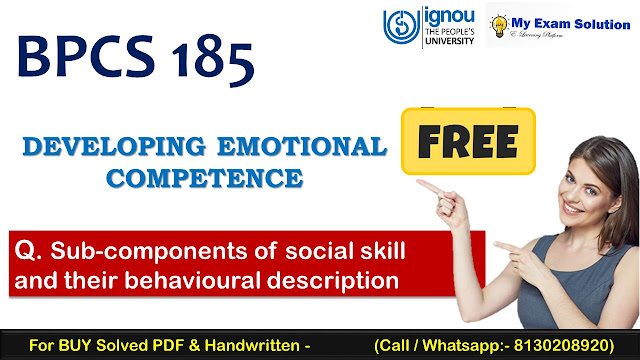Sub-components of social skill and their behavioural description
Social skills are a vital aspect of human interaction and communication. They enable individuals to effectively navigate social situations, build meaningful relationships, and collaborate with others.
While social skills encompass a wide range of abilities, they can be broken down into various sub-components.
Sub-components of social skill and their behavioural description-There are the some sub-components of social skills and their behavioural description :-
Sub-component
1:
Active Listening: Active listening is the ability to fully engage with others during a conversation, demonstrating genuine interest and understanding. Behaviors associated with active listening include maintaining eye contact, nodding or using other non-verbal cues to indicate attention, and avoiding interruptions.
Sub-components of social skill and their behavioural description-Active listeners also engage in
reflective responses, such as paraphrasing or summarizing the speaker's points,
to ensure accurate comprehension.
Sub-component 2:
Empathy: Empathy involves the capacity to understand and share the emotions, thoughts, and experiences of others. Individuals who display empathy exhibit behaviors such as actively listening to others' concerns, demonstrating non-judgmental attitudes, and offering emotional support.
Also Read-
They also display verbal and non-verbal cues that
show understanding, such as nodding, mirroring body language, and using
appropriate facial expressions.
Sub-component 3:
Non-Verbal Communication:
Non-verbal communication encompasses the use of body language, facial
expressions, gestures, and tone of voice to convey messages and emotions.
Individuals with strong non-verbal communication skills are adept at
interpreting and utilizing these cues effectively. They display open body
posture, maintain appropriate eye contact, use appropriate facial expressions,
and modulate their tone of voice to match the context of the interaction.
Sub-component 4:
Verbal Communication: Verbal communication refers to the use of words, language, and speech to express thoughts, ideas, and feelings. Individuals with strong verbal communication skills are clear, concise, and articulate in their speech. They use appropriate vocabulary, tone, and volume, adapting their communication style to suit different audiences and situations.
Sub-components of social skill and their behavioural description-They also engage in active dialogue, asking
relevant questions, providing constructive feedback, and expressing their ideas
in a coherent and organized manner.
Sub-component 5:
Conflict Resolution: Conflict resolution involves the ability to manage disagreements and conflicts in a constructive and collaborative manner. Individuals skilled in conflict resolution actively listen to all parties involved, seek to understand different perspectives, and find mutually beneficial solutions.
Sub-components of social skill and their behavioural description-They
demonstrate assertiveness without aggression, express their concerns and needs
clearly, and engage in problem-solving discussions rather than resorting to
blame or criticism.
Sub-component 6:
Cooperation and Collaboration: Cooperation and collaboration skills involve working effectively with others towards a common goal. Individuals with strong cooperative skills actively contribute to group discussions, respect diverse opinions, and show flexibility in finding compromises.
Sub-components of social skill and their behavioural description-They demonstrate good teamwork by sharing
responsibilities, communicating openly, and supporting the contributions of
others. They also actively seek input from team members and facilitate
inclusive decision-making processes.
Sub-component 7:
Social Awareness: Social awareness
encompasses the ability to understand social dynamics, recognize social cues,
and adapt behavior accordingly. Individuals with strong social awareness are
attuned to the emotions and needs of others. They show sensitivity to cultural
differences, understand social norms, and adjust their behavior to maintain
positive interactions. They also demonstrate respect for personal boundaries
and exhibit appropriate social etiquette in different contexts.
Sub-component 8:
Emotional Regulation: Emotional
regulation refers to the ability to manage and control one's own emotions in
social situations. Individuals with strong emotional regulation skills display
self-awareness and are able to recognize and understand their own emotions.
They regulate their emotional responses, avoiding impulsive reactions, and
instead responding thoughtfully and appropriately. They also demonstrate empathy
towards others' emotions, recognizing and validating their feelings while
maintaining their own emotional stability.
Social skills encompass a range of
sub-components that are essential for effective communication and successful
social interactions. By understanding these sub-components and their associated
behavioral descriptions, individuals can develop and refine their social skills
to build stronger relationships, enhance collaboration, and navigate social situations
with confidence. By consciously practicing and improving these sub-components,
individuals can cultivate meaningful connections and contribute positively to
their personal and professional lives.







0 comments:
Note: Only a member of this blog may post a comment.